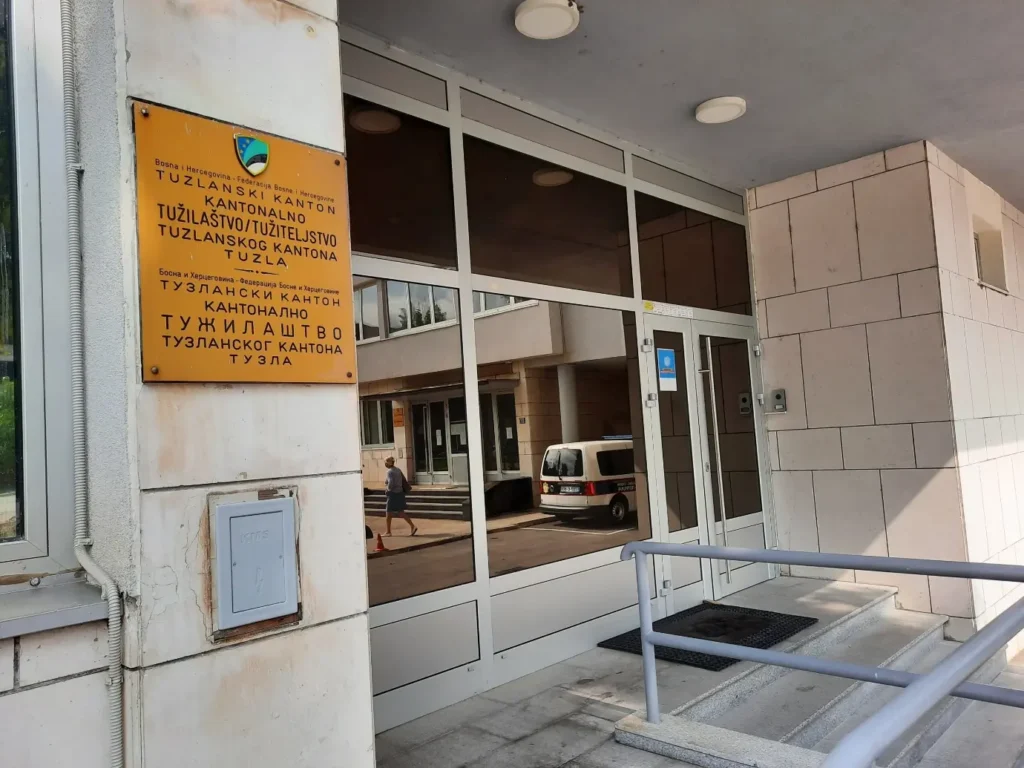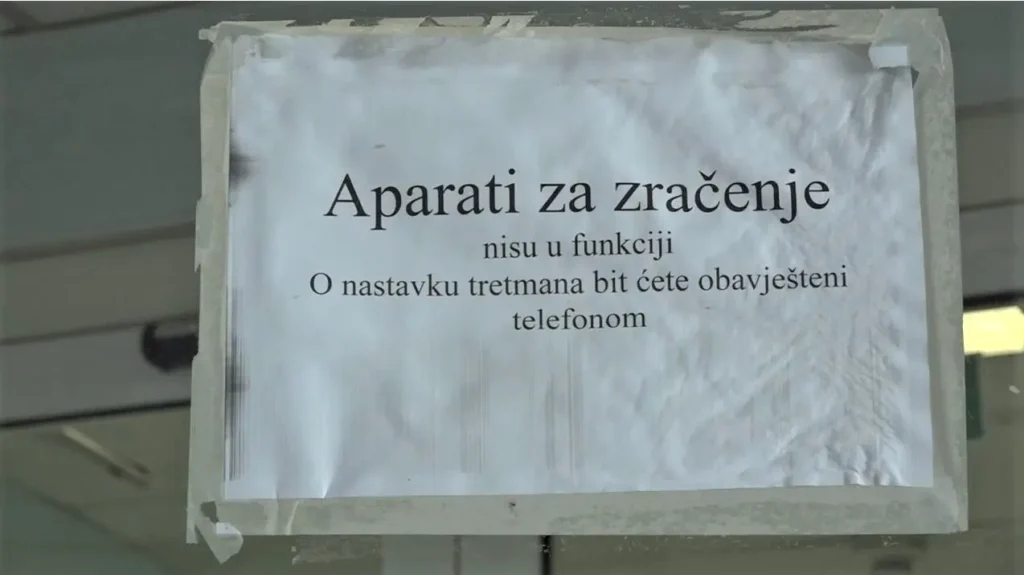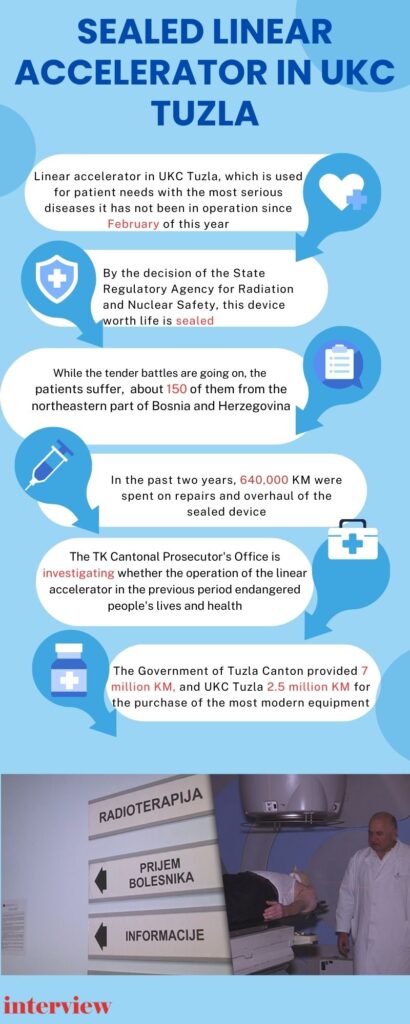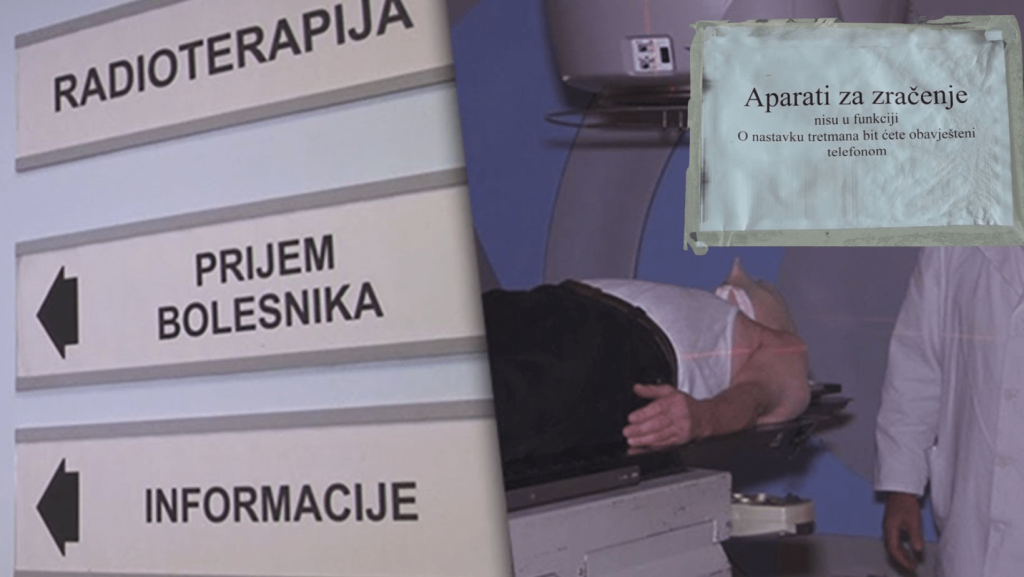While tender battles continue, 150 oncology patients are suffering. Whether there are elements of a criminal offence in the actions or previous inactions of responsible individuals will soon be decided by the Cantonal Prosecutor’s Office of TK
The linear accelerator at the University Clinical Center Tuzla, used for the treatment of patients with the most serious illnesses, has not been operational since February of this year.
By the decision of the State Regulatory Agency for Radiation and Nuclear Safety, this invaluable device has been sealed.
After Inspection, the Prosecution Takes Over the “Case”
And it all began after the acting CEO, Dr Denijal Tulumović, and the rest of the management requested the Agency to conduct an examination of the device.
This was preceded by information from another case at the Cantonal Prosecutor’s Office of TK, details of which cannot be disclosed due to the ongoing investigation.
– We informed the TK Ministry of Internal Affairs based on that information, and they informed the State Regulatory Agency for Radiation and Nuclear Safety. Then, the University Clinical Center (UKC) also requested the state agency to inspect the device, and after the inspection, an order was issued to prohibit its use. What I can disclose is that the Cantonal Prosecutor’s Office of TK has engaged a team of experts in medical physics from Sarajevo, Zenica, and Mostar to determine whether there was any endangerment of lives and health of people, i.e., patients, during the operation of the linear accelerator in the previous period – said Admir Arnautović, spokesperson for the Cantonal Prosecutor’s Office of TK, in an interview with Interview.ba.
SIPA at UKC Tuzla
After the University Clinical Center (UKC) Tuzla requested an inspection of the devices from the state agency and following the completion of the inspection, a decision to prohibit the operation of three devices at the Tuzla Clinical Center was promptly issued.

The Agency submitted a report to the Cantonal Prosecutor’s Office of TK, which initiated investigative actions.
Subsequent orders from the acting prosecutors of the Cantonal Prosecutor’s Office of TK were issued, and extensive documentation was collected.
Officials from the State Investigation and Protection Agency (SIPA) were also present at the University Clinical Center. Of course, the acquisition of the new linear accelerator was used for daily political debates and disputes.
Who is Responsible?
In this entire story, neither guilty nor at fault, patients and their families are suffering. For months, they have been forced to wait for appointments and travel for treatments to Sarajevo, Mostar, and/or Zenica.
– My brother is an oncology patient and a demobilized soldier of the Army of Bosnia and Herzegovina. His cancer was diagnosed in January 2023. And now he’s struggling with administration. We submitted all the reports in March, and that’s when he was scheduled for radiation therapy in Zenica. The reports were delivered to the UKC in March, but they reached Zenica on June 27th. And since then, we’ve been waiting for a call from Zenica for days. We wonder who is responsible – wrote J.J., the sister of the critically ill N.B. from Tuzla, on social media.
The management of the University Clinical Center Tuzla claims that they have completed their part of the procedure, but the case is now in the Office for Appeals.
While tender battles continue, patients are suffering, around 150 of them from the northeastern part of Bosnia and Herzegovina. Whether there are elements of a criminal offence in the actions or previous inactions of responsible individuals, a judgment, or a final prosecutorial decision, is expected soon to be made by the Cantonal Prosecutor’s Office of TK.
Tender, Followed by Appeal
Meanwhile, for six months, the agony of seriously ill patients and their families continues. Why? The shortest answer would be – due to the administratively complex reality in Bosnia and Herzegovina.
Shortly after the sealing of the linear accelerator, which was already on the brink of failure, considering that 640,000 KM had been spent on repairs and maintenance in the past two years, the Government of the Tuzla Canton allocated 7 million KM through a budget revision for the year 2023, and the University Clinical Center allocated 2.5 million KM for the procurement of the most advanced equipment.
However, the procurement was delayed due to an appeal against the issued tender. This further extended the agony of oncology patients who are compelled to endure lengthy journeys to other centres and return home after far from innocuous radiotherapy treatments.
Numerous Consequences
Oncology patients and their families during the period of radio or chemotherapy face numerous psychological, emotional, and sociological challenges. Seeking treatment outside the borders of Bosnia and Herzegovina is nearly impossible if the patient or their family doesn’t have substantial savings…
 The question arises: who is responsible when the linear accelerator at the University Clinical Center Tuzla has frequently malfunctioned and caused additional headaches for patients over the past few years? Not to mention the consequences for mental and physical health.
The question arises: who is responsible when the linear accelerator at the University Clinical Center Tuzla has frequently malfunctioned and caused additional headaches for patients over the past few years? Not to mention the consequences for mental and physical health.
“Investigators from the Police Directorate of the Ministry of Internal Affairs of the Tuzla Canton, upon the orders of the Cantonal Prosecutor’s Office of TK and the Municipal Court in Tuzla, have seized all relevant documentation related to the radiotherapy device. An order for an expert examination of the disputed devices has been issued. After all the verifications were conducted, a prosecutorial decision will be made to determine whether there are elements of any criminal offence in the actions or inactions of responsible individuals at the University Clinical Center Tuzla”, stated Admir Arnautović, spokesperson for the Cantonal Prosecutor’s Office of TK.
What Did SIPA Seek?
The Acting CEO of the University Clinical Center Tuzla, Prof. Dr Denijal Tulumović, confirmed that inspectors from the State Investigation and Protection Agency (SIPA) had been present at the institution for several days. However, he added that their presence, in his assessment, had an entirely different nature compared to the shutdown of the linear accelerator. Director Tulumović did not disclose any other reasons or motives for why SIPA inspectors were “scrutinizing” the documentation of the University Clinical Center Tuzla.
Management Changes in Rapid Succession
The Medical Director of the University Clinical Center Tuzla, Assistant Professor Dr. Igor Hudić, emphasises that the current administration has been in charge of the institution for a relatively short time, since the end of 2022. He notes that the now-sealed “linear accelerator” was invoiced by previous management.
Those previous managements were subject to frequent changes due to shifts in legislative and executive power in the Tuzla Canton.
The issue of the linear accelerator has been relevant for almost a decade, during which time the directors were: Elmir Čičkušić, Nešad Hotić, Vahid Jusufović, Alen Kamerić, and the current acting CEO, Denijal Tulumović.
Furthermore, medical directors also changed depending on who held the majority in the Assembly of the Tuzla Canton. Thus, they came from various parties including the Party for Bosnia and Herzegovina, the Party of Democratic Action, the Social Democratic Party of Bosnia and Herzegovina/Social Democrats of Bosnia and Herzegovina, the Movement for Democratic Action of Bosnia and Herzegovina, and the current management from the Party of Democratic Action/Democratic Front.
However, the responsibility for addressing this matter now falls to the judiciary. It is up to the current management to find a solution.
Outwitting the Wise Administration: Who Prevailed?
The current Medical Director, Dr. Hudić, claims that funding for the procurement of new equipment has been secured with the assistance of the Government of the Tuzla Canton.
However, that’s not enough. Because who outwitted our wise administration?
“In essence, just two days before the expiration of the appeal period, one of the equipment manufacturers filed an appeal. And now the case is with the BiH Appeals Office. We are awaiting their decision, as well as the decision of the State Regulatory Agency for Radiation and Nuclear Safety, in order to potentially reinstate the existing linear accelerator”, says Dr Hudić.
He also recalls the management’s remark that until February, the State Regulatory Agency for Radiation and Nuclear Safety had been granting operational permits for the linear accelerator without any issues.
What changed then, and why was a decision issued to prohibit the use of three radiotherapy devices?
Dark and Tragic Statistics
According to statistical data, every year, approximately 2,000 individuals are diagnosed with various types of cancer in the northeastern part of Bosnia and Herzegovina (covering areas like Tuzla, Brčko, Bijeljina, and Zvornik). The University Clinical Center Tuzla provided radiotherapy not only for patients from the Tuzla Canton but also for those from the Posavina Canton and Brčko District of BiH. Now, all of them are being referred to other centres, and priority lists are being formed.
“By mid-June of this year, we had between 150 and 160 patients who completed specific radiotherapy treatments in centres in Sarajevo, Mostar, and Zenica. Other patients have been granted approval and are awaiting their appointments. Depending on the diagnosis and the specific protocol, priority lists are established. We have patients who need radiotherapy within seven days, and they are at the top of the priority list, but we also have patients who undergo combined therapy, including radiotherapy and chemotherapy. Some receive treatment here, while others receive treatment in other centres”, says Dr Hudić.
However, patients are expressing dissatisfaction.
Once the diagnosis is determined with all the necessary paperwork, patients go to the Health Insurance Institute of the Tuzla Canton. Reports and documentation are forwarded to other centres, but there are cases where calls for radiotherapy are delayed by several weeks.
“Patients have a legitimate reason to be dissatisfied. We expect a positive response from the State Regulatory Agency for Radiation and Nuclear Safety to reactivate the currently sealed equipment. But until such a decision is made, patients have to go to other centres for treatment. Clearly, there were delays in taking action earlier, and we are dealing with the situation as it stands. Funding has been secured, and once the contract is signed with the supplier, we can immediately transfer the money. However, the legal procedure is as it is; it’s a multimillion-dollar contract, and regulations are strict. That’s why the waiting continues”, emphasizes Assistant Professor Dr. Igor Hudić.
End of the Year?
Radiotherapy and chemotherapy leave indelible consequences on the health of patients as well as their entire families. Patients are mainly confronted with a “fait accompli” because, after the shocking realization of a serious illness, they are subjected to the arduous process of potential recovery. However, expressions of discontent vary individually and case by case, and until access to quality radiotherapy improves, many fear they will have to continue waiting.
The acting CEO of the University Clinical Center Tuzla, Dr Tulumović, emphasizes that acquiring such machines is not a simple procedure, as they are not like ultrasound devices, for example.
Machines like linear accelerators are ordered so that the manufacturer can create them.
“We have promises from certain suppliers that it will be within a 120-day timeframe. However, even though I am always an optimist in life, I fear how much time all of this will take for us. We need to carry out certain construction work, dismantle the old device, and install the new one, so it’s difficult to predict anything”, stated Dr Tulumović.
Once again, a temporary solution rests in the hands of the State Regulatory Agency for Radiation and Nuclear Safety and the Cantonal Prosecutor’s Office of TK.
Grim Statistics
If permission is granted to operate the currently sealed linear accelerator, patients will not have to travel to Sarajevo, Mostar, and/or Zenica.
However, it remains questionable how safe and effective the therapy from such a device is and whether potential treatments will have repercussions on patients’ health.
Unfortunately, some patients in the past period did not live long enough to witness either the activation of a new or the refurbished linear accelerator. They remain, as usual, in the statistics. Who is to blame? The circumstances are being determined by the Cantonal Prosecutor’s Office of TK.
But when everything is added up and subtracted, the deceased cannot speak, or in common terms, crows do not pick out each other’s eyes, raising legitimate concerns that everything will eventually be obscured by “rosemary, snow, and weeds”.





